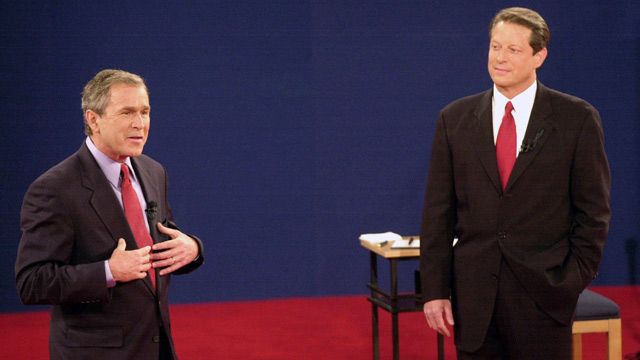
There are, of course, differences between a campaign speech and a modern presidential debate. One is a carefully coached series of talking points drenched in populist rhetoric; the other is a campaign speech.
Some decry the ridiculousness of these so-called debates, with heavily-stipulated formats that seem designed to invite manipulation, avoid true clash and allow artful dodging — now popularly referred to as “the pivot.”
But the media still takes these events seriously as debates, all evidence to the contrary. They even trot out “master debaters” for sharp debate analysis — like CNN’s Todd Graham, director of debate at Southern Illinois University-Carbondale, and The Daily Beast’s Brett O’Donnell, a political strategist and former Romney debate coach — as if these debates truly matched up to the contentious and noble Lincoln-Douglas debates of old… or even Lincoln-Douglas debates of new.
Modern “Lincoln-Douglas debates” are one-on-one collegiate policy debates named after the famous series of oratorical duels between challenger Abraham Lincoln and incumbent Stephen A. Douglas for an Illinois senate seat in 1858. I’ve seen and participated in my fair share of collegiate Lincoln-Douglas debates, and trust me, formal collegiate debates are to presidential debates what true ballroom competition is to Dancing with the Stars.
But, alas, what can be done? The Commission on Presidential Debates is at the mercy of the candidates’ mutually-agreed-upon safety measures, the debate format is at the mercy of the Commission and the truth is at the mercy of highly paid spin doctors and debate coaches.
Turns out there may be one thing broadcasters can do to increase knowledge and facticity. This morning, NPR aired a story in which behavioral psychologist Todd Rogers suggests a solution as simple as it is specific: print the moderator’s or audience member’s question on-screen as the candidate answers it. The hope is it will remind viewers of the topic even as the candidates try to dodge it.
NPR points out that CNN put the questions on-screen during the Republican primary debates they broadcast. Debate coach Brett O’Donnell didn’t think it made a difference in the what the candidates had to say or the audience’s impression of them, but Rogers says he’s done a study that shows printed questions do help watchers spot pivots.
I hope that the presidential debate moderators will keep the candidates on topic if they spring one of their practiced “zingers” instead of answering a question put before them, but if they don’t (or can’t), it would be a service to viewers for broadcasters to help them keep track of the number of pivots on display.

